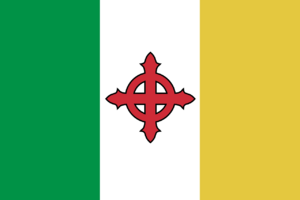Ebrarian people: Difference between revisions
Jump to navigation
Jump to search
No edit summary |
No edit summary |
||
| Line 16: | Line 16: | ||
| philosophies = | | philosophies = | ||
| religions = Primarily [[Amendantism]], but also [https://en.wikipedia.org/wiki/Eastern_Orthodox_Church Orthodox Christianity] | | religions = Primarily [[Amendantism]], but also [https://en.wikipedia.org/wiki/Eastern_Orthodox_Church Orthodox Christianity] | ||
| related_groups = | | related_groups = [[Gallasian people]], [[Vorstish people]], [[Aroman Empire|Other Aromance peoples]] | ||
| footnotes = | | footnotes = | ||
}} | }} | ||
Revision as of 16:31, 27 September 2021
Ebrarianos | |
|---|---|
 | |
| Regions with significant populations | |
| Ebrary | |
| Languages | |
| Ebrarese | |
| Religion | |
| Primarily Amendantism, but also Orthodox Christianity | |
| Related ethnic groups | |
| Gallasian people, Vorstish people, Other Aromance peoples |
Ebrarians are an ethnic group and nation native to Ebrary who speak the Ebrarese language. The Ebrarian identity originates in the Ebrarian city-states era from the 6th to 10th century. Their ethnonym is derived from the name of Marcus Ebraius, the Aroman general who founded the city of Ceres in 413 AD. The majority of the citizens of Ebrary are ethnic Ebrarians.
The Ebrarian population trace their lineage to the Ebraro-Celts who inhabited Ebrary before the arrival of Marcus Ebraius, and the various Aroman soldiers and migrants who came afterwards. The Aroman settlers founded a variety of city states in the southern portion of the modern country of Ebrary.